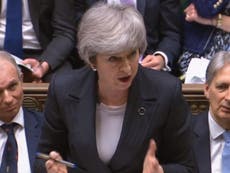I grew up among knife crime and I know Philip Hammond’s plan to throw money at the problem won’t work
It seems parliamentarians are failing to engage with the youth or families from certain communities affected, while there is also a distrust within those communities towards the system
Back in 1995, when I was 16 years old, I was en route home from my sixth form college when I saw dozens of police cars which I would later find out were heading to my school to attend to my former headmaster.
He had been stabbed, and would later die, becoming the first headteacher in the UK to be a victim of knife crime.
Since then knife crime in the capital has spiralled out of control. New figures show there has been a 93 per cent increase in the number of young people targeted by knives. For many years it has been reported that the knife crime epidemic has been mainly a “black-on-black” crime, but this type of racist stereotyping is as misleading as it is problematic – this issue affects young people from all backgrounds across the country. But there’s no question that it is people from oppressed and underprivileged communities who are the most directly affected.
Recently, defence secretary Gavin Williamson suggested the military could be deployed to respond to the knife crime crisis. It’s easy to see how this could be considered a short-term solution to diffuse a situation, but it completely ignores the real issues at play.
The army wouldn’t be able to solve the problem. It can’t be equated to the war on terror – this is about dealing with fragile communities who need immediate social help. It is a deep-rooted issue connected to poverty and mental health.
Enforcing a tough approach with army intervention would do nothing to address the experiences of people who feel carrying a knife to will solve their grievances. What the government should be doing is finding ways to reach out to those who feel disconnected from society.
First and foremost we should have direct funding going to those communities affected; appointed role models who can engage with the youth and families to seek opportunities for those who feel disconnected; and put in place partnerships with the public and private sector to offer jobs in the local area. We could instate annual community days to reward those who have excelled and made a difference in their area. This will help to eradicate the notion that there is no hope for those living in deprived areas and the only option available is to meddle in crime in order to get out of their situation.
Tragically, there are neighbourhoods where families are scared to let their children out at certain times of the day or talk to their neighbours. These are areas ridden with gang crime. I experienced this first hand – my mother would keep tabs on my brother and I to ensure we did not get mixed up with the wrong crowd. When I was at school I would often hear stories from my classmates about certain patches of London which had become no-go areas. It’s been happening for decades and successive governments have done nothing to clamp down and combat the root of the problems.
I strongly believe that government cuts to youth clubs, police and other public services have contributed in the problems on our streets. Money is part of the solution but working with the right organisations who have a greater insight into what is going on our streets is crucial.
Earlier today during his Spring Statement the chancellor Philip Hammond earmarked £100m to tackle the current knife crime epidemic, but no figure will solve the issue. But there’s no point in ploughing funds without having a detailed plan to ensure those affected are receiving the help they require.
It seems parliamentarians are failing to engage with the youth or families from certain communities affected. There is also a distrust within those communities towards the system. In order for any partnership to work, communication and trust are key elements to building a bond to working on any proposed initiative.
Another concern is the lack of support or guidance given to parents. Parental spot checks are vital in reducing the number of knives on our streets. Every parent should make sure their children’s bags are checked every day by the front the door before they leave to go to school, visit friends or pop to the local shops.
It’s the responsibility of parents to ensure their kids are safe, they must take time out to do this. They must also be firm and ensure discipline. This must be extended to community hubs drop-in centres for teens who want to dispose of their knives without going directly to the police.
What we really need is more people like Faron Alex Paul, who is a parent and activist. He is the brains behind an initiative which helps to decrease the number of knives on our streets. He spends most evenings helping local communities by engaging with youngsters who have knives and rewarding them for turning them in.
His initiative presents a risk but it’s the only logical way to have direct contact with those who feel going directly to the police is not a viable option. We need people like him to tap into the mindset to help diffuse the epidemic.
Getting the army involved, or throwing money at it won’t solve our knife crime. What vulnerable children need is support from their communities. The government must do more to engage with them and find out from those affected what’s really going on in order to do their part and help stop further stabbings and killings.



Join our commenting forum
Join thought-provoking conversations, follow other Independent readers and see their replies